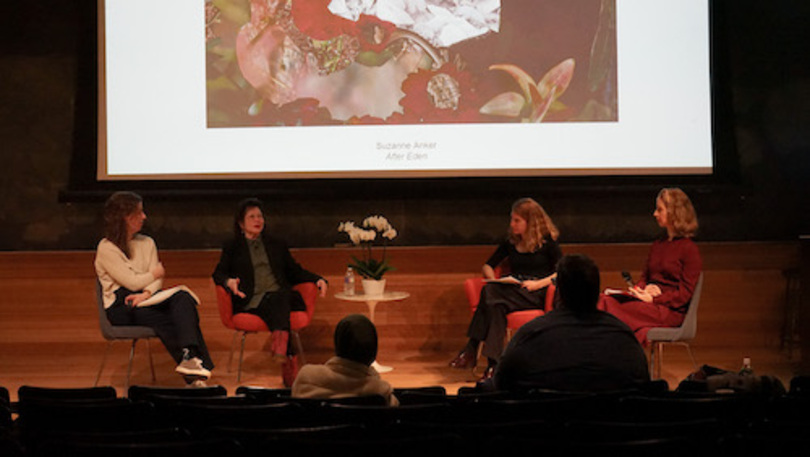Visuals artists examine the relationship of art and science in new SU symposium

For the inaugural symposium of the Renée Crown University Honors Program, Angela Breitenchbach and Suzanne Anker participated in a discussion about beauty and science in Slocum hall on Tuesday. SU faculty members Heidi Hehnly and Karin Nisenbaum presented this event to audience members. Leanne Rivera | Staff Photographer
Get the latest Syracuse news delivered right to your inbox.
Subscribe to our newsletter here.
Art, philosophy and even science are all interconnected with beauty, said Angela Breitenbach. In bringing all of these different aspects together, one may even come to better understand scientific theories and topics.
“I want to suggest that our understanding of things involves this unifying of a variety of phenomena and ideas,” said Breitenbach, a philosophy professor at the University of Cambridge.
On Tuesday afternoon, Breitenbach joined Suzanne Anker, a visual artist who works with the intersection of art and biological sciences, to speak for the Renée Crown University Honors Program’s inaugural symposium called “The Value of Beauty and Beauty in Science.”
Anker, who is also the chair of the BFA Fine Arts Department at the School of Visual Arts in Brooklyn, got the chance to highlight her own work and discuss the intersectionality within it between beauty and science.
Anker said that many of her pieces call attention to the beauty of nature, but at the same time, they raise awareness about issues like climate change and the extinction of species. One of the pieces Anker showcased during her discussion focuses on the rapid changing of the climate.
“I took some flowers and put them in a snow storm, showing how lately, all of these seasons happen at the same time,” Anker said.
Anker had an exhibition at the Everson Museum of Art in 2019 which was called 1.5°, which highlighted similar issues regarding the changing climate. In light of her return to Syracuse, Anker displayed photos of the exhibition to the audience. Her pieces ranged from small-scale, detailed sculptures of sea sponges and reefs to larger and more colorful photographs of nature and the varying aspects of it.
A big part of this exhibit, Anker said, was her use of sculptures of dead coral. Anker said that though these sculptures were beautiful to the eye, they were unfortunately reminiscent of the troubling state of coral reefs — thus reaffirming the intersectionality between biology, other sciences and beauty.

Jacques Megnizin | Digital Design Editor
Ali Holtzapple, the associate director of the SU Honors Program, said that Anker’s discussion on these issues was extremely important and effective.
“What I especially appreciate about Suzanne’s work is it compels action,” Holtzapple said. “And I love any event that takes us from a room and makes us exit the room to make change.”
Similar to Anker, Breitenbach discussed the convergence of art and science. Breitenbach said that to many, this convergence may not be obvious to many, because they see science as black and white explanations that exclude the imagination of art. Breitenbach, however, disagrees, and used famous scientist Werner Heisenberg’s ideas to elaborate on this concept.
Heisenberg found aesthetic and beauty while computing his theories and even escaped into beautiful parts of nature to do so, Breitenbach said. She connected this form of engagement with his science with the ways in which people engage with art —we find beauty in the art we look at, and in turn, that affects how we react to it and view it, she said.
After the discussion, Holtzapple said that these forms of intersectionalities between art, science and beauty are important to the honors program, and had a lot to do with the program’s decision to invite Breitenbach and Anker to speak. Holtzapple said that many of the events the honors program puts together are interdisciplinary because “nothing is isolated.”
Holtzapple took note of the connection between the audience members and the speakers, and that the discussion sparked conversations on both sides of the room.
“We are all connected by wonder,” Holtzapple said. “And the value in something like today is to almost share our own wonder and where that creates purpose.”





